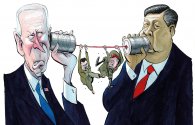The red line: Biden and Xi’s secret Ukraine talks revealed
spectator.co.uk/article/the-red-line-biden-and-xis-secret-ukraine-talks-revealed/

Since the beginning of Russia’s invasion of Ukraine, China has played a decisive – though publicly low-profile – role in strategic decision-making in both Washington and Moscow. As I report for the first time in my new book Overreach, it was a back-channel intervention approved by Beijing that caused the US to scupper a deal for the Poles to provide Soviet-made MiG-29 jets to the Ukrainian Air Force back in March. And since September a flurry of personal diplomacy by Chinese foreign minister Wang Yi with Nato and the US has led to a rare moment of public agreement over Russia, when Xi Jinping said that the world ‘needs to prevent a nuclear crisis on the Eurasian continent’ in a meeting with Joe Biden at the G20 summit in Bali.
Throughout the war, China’s true position on the Russia-Ukraine conflict has been hard to pin down – not least because Beijing has been telling both sides what they want to hear. In March, Wang implicitly appeared to be blaming the US for ‘stoking tensions’ and ‘sowing discord’ with Russia. Last month he told his Russian counterpart, Sergei Lavrov, that ‘China will also firmly support the Russian side, under the leadership of President Putin, to unite and lead the Russian people’, according to state broadcaster CCTV. Wang also promised that ‘China is willing to deepen contacts with the Russian side at all levels’. Yet in September, on the sidelines of the UN General Assembly, Wang had told Nato Secretary-General Jens Stoltenberg that China ‘stays open-minded to dialogues and exchanges with Nato and is willing to jointly promote the sound and steady development of bilateral relations … in the spirit of honesty and mutual respect’.
---
Section cropped... See article
---
What changed Washington’s mind? In part, it was an urgent and confidential back-channel initiative led by the UK-based Institute for East West Strategic Studies involving former European leaders and senior officials, and ultimately endorsed by the Chinese leadership. Ever since Putin’s 27 February declaration on nuclear readiness, the PLA had also been reaching out through military-to-military (as opposed to diplomatic or political) channels to senior Russian general officers with whom they had made personal contact over years of joint military exercises and military procurement talks. Beijing’s aim was to ensure that even if there were a political decision to use nukes, the Russian army would insist on sticking to its long-standing nuclear military doctrine to use them solely if provoked by attacks on Russian soil. Through these unofficial ‘track two’ contacts, Washington and the PLA agreed – unusually, given a deterioration in relations during the Donald Trump presidency – that if the US stopped the MiG deal, Beijing’s generals would do their best to defuse Putin’s nuclear threat on an operational level. ‘It worked,’ said the Chinese source. ‘The [US] decided that supplying aircraft was a step too far.’
Though this back-channel initiative of early March has not been previously reported, the fact that the US retained a fundamentally cautious attitude to supplying strategic weapons to Ukraine throughout the war effectively confirms that Washington, remained deeply aware of Chinese concerns, which were shared with many of the largest nations in the European Union. Despite a dramatic escalation in supplies of money and military hardware – including Nato-standard 155mm artillery capable of firing guided shells and the High Mobility Artillery Rocket System – Nato has held back on providing attack aircraft, helicopters, Nato-standard tanks, long-range battlefield missile and cruise missile systems.
At the same time, Chinese backing for Moscow remained equally cautious. Beijing offered diplomatic and informational support – but excluded significant military cooperation, forcing the Russians to buy drones from Iran, cannibalise domestic appliances for computer chips and attempt to buy back helicopters, missiles and missile defence systems from its military customers around the developing world. The threat of US sanctions on their global operations caused many leading Chinese banks such as ICBC, the New Development Bank and the Asian Infrastructure Investment Bank to withdraw credit and financing from Russia. Chinese energy giants such as Sinochem also suspended all Russian investments and joint ventures. In August, UnionPay – the Chinese equivalent of Visa and Mastercard – also ceased its cooperation with Russian banks, citing sanctions. The material motivation for Beijing’s corporations to pull out of Russia was clear: before the war China did $100 billion in trade with Russia (rising by a projected $30 billion this year thanks to increased oil imports) but more than $1.5 trillion with the US and EU.
With Biden and Xi’s joint condemnation of the threat of nukes at Bali earlier this month, the so-called ‘track two’ understandings of March have become a ‘track one’ public policy. Thanks to Wang’s shuttle diplomacy, Nato and China have effectively aligned on not escalating the Ukraine-Russia conflict, according to the Chinese source. Over a series of meetings with Nato leadership since early September, Wang pledged to use China’s considerable leverage in Moscow to dissuade Putin from using nukes, while in return Nato has affirmed that they would not provide strategic weapons to Ukraine.

